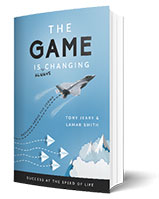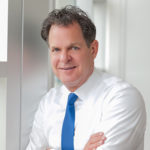Q: This year has been incredibly unpredictable, and I’m having trouble looking ahead without feeling overwhelmed. How can I better cope with the uncertainty of today’s world?
A: Already 2020 has ushered in more change than many of us have experienced in our lifetimes. We’ve had to adjust to living through a pandemic, working and schooling from home, and an ever-increasing sense of divisiveness in political and social issues. The game has definitely changed.
Actually, that’s wrong: The game is continually changing, and choosing your ongoing responses is crucial.

I’ve been fascinated with change for many years. I believe mindset is the foundation of mastering change, and even converting change to a great benefit.
I recently teamed up with Lamar Smith, the former CEO of a successful international financial services company, to launch a book called The Game Is Always Changing. The two of us identified a handful of ways to not only cope with change, but get ahead of it. Here’s how.
Reset Your Thinking
The challenges we face—in our personal lives, in our businesses and in our nation—demand a higher level of intentional, disciplined thought than ever before. We need different results than we’re seeing, and we need them quickly. Our mindsets must be preconditioned to offer a head start for the changes that will continue to come so we don’t deal with each one from scratch.
This preconditioning revolves around looking at each change for the opportunities it presents, the problems it introduces and the risks it reveals. Those who are skillful at this analysis will have an advantage over those who have no plan and have not trained themselves.
Experts agree that there are two mindset types—growth and fixed. Those who have a fixed mindset accept the status quo instead of looking for alternatives. Those with a growth mindset tend to look at failure as an opportunity to grow, and they are typically more open to exploring new ideas and opportunities. As you can imagine, having a growth mindset is significantly better.
Begin changing your outlook by cultivating a growth mindset. You will be able to turn frustration into an exciting opportunity, which will empower you to embrace the next change that comes your way.
Do the Work
We believe there are three main pieces to the mindset puzzle: individual, leadership and organizational. Here’s how you can make progress in each category.
Individual.
People tend to fall into one of three camps: those who see change as negative so they resist it; those who are indifferent to it; and those who view change as positive so they encourage it.
Those who see change as negative are resistant for a handful of primary reasons—some worry about losing their sense control, while others struggle immensely with uncertainty.
Those who are indifferent often have a “this-too-shall-pass” mentality. These individuals usually expend a great deal of energy seeking and justifying their minimal response to change, thus missing huge opportunities in the process.
For those who embrace it, change can be a beautiful thing, because each change creates fresh, exciting thinking. These people have a positive, solution-oriented mindset and tend
to flourish.
Leadership.
As a leader, it’s important to gain clarity by asking: Where are we going, what is the “why,” what is the rationale and how do I best lead the charge?
Once you have clarity, it’s important to share your vision and communicate the “why” with those in your organization. Let people know how this is a win for them. The most influential leaders make progress while instilling hope and confidence in their teams.
Organizational.
An organization can be a family unit, a club, a department or an entire company. Does your organization foster change and prioritize working as a high-performing team? High-performing teams focus on being as effective as possible while continually reevaluating to work toward quality, with each team member being individually motivated with high levels of investment in the outcome.
Focus on the Present
The past meets the future at a control point known as the present moment. Too many people miss the present moment of their lives because they’re busy worrying, daydreaming or doubting themselves.
To unleash the power of the present moment, you must have the courage to change your mindset. In the foreseeable future, we will only see the rate of change accelerate. How you shift your mindset and embrace change—personally, as a leader and in an organization—will be a significant factor in whether or not you thrive.
This article originally appeared in the November/December 2020 issue of SUCCESS magazine.
Photo by Jacob Lund/Shutterstock.com



